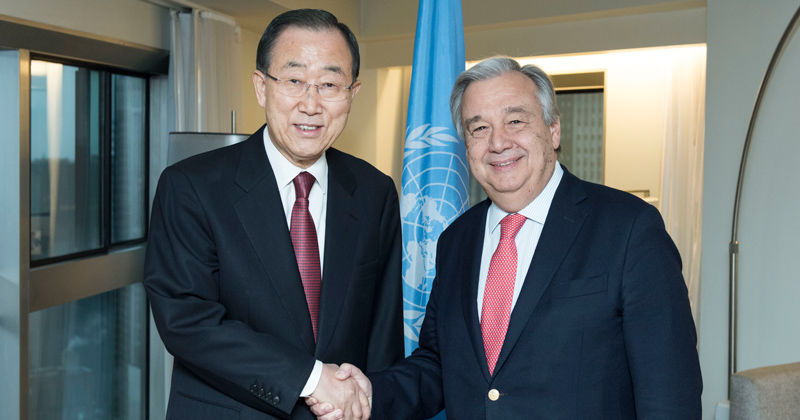


Inspiring youth
Photo courtesy of the United Nations September 17, 2020
Former UN Secretary-General Ban Ki-moon discusses diplomacy and world issues in Biden Institute event
President John F. Kennedy is one of the patron saints of diplomacy. His words have been responsible for generations of aspiring ambassadors who would one day make a difference.
Ban Ki-moon is among the few alive today who can say they met the 35th president of the United States and heard those words in person.
In 1962, Ban had the opportunity to visit the United States from his native South Korea and meet JFK after winning an English language competition.
“There are no national boundaries,” Kennedy said. “There is only a question of whether we can extend a helping hand.”
Ban, who would one day become the eighth Secretary-General of the United Nations, heard the words he has chosen to live by, using them as a springboard into a distinguished and decorated career that has shaped world history.
“That was really inspiring to me,” Ban said Tuesday evening during a virtual conversation hosted by the University of Delaware’s Biden Institute. “At that time, I thought that what I should do was to really extend my helping hand. I thought the most urgent thing was to help my own country.”
After serving as a diplomat for South Korea, he climbed the ranks – including posts as Director of the United Nations Division and National Security Advisor to the President – and then reached the pinnacle in 2007, succeeding Kofi Annan as UN Secretary-General.
Ban retired four years ago as Secretary-General, but he continues to be a leader on the global stage. UD President Dennis Assanis noted the importance of hearing from a figure such as Ban as the world grapples with the coronavirus (COVID-19) pandemic and other crises simultaneously.
“This virus spread around the world very quickly, and no country has been immune to its effects. It’s also true, though, that we have a new opportunity for global collaboration and innovation,” Assanis said. “We can work together — we must work together — to protect each other and advance the wellbeing of every person on our planet. To achieve this level of global cooperation, we need global leadership. Fortunately, we have people like Mr. Ban Ki-moon.”
Host Valerie Biden-Owens, vice chair of the Biden Institute, tried with all her might to get Ban to talk about his career and achievements. The hour-long event easily could have turned into an all-night affair. Ban was central to the 2007 Climate Change Summit; the 2030 Agenda for Sustainable Development, finalized in September 2015; The Paris Climate Agreement in December 2015; and UN Women, which is dedicated to gender equality and the empowerment of women.
Ban was more interested in her questions about a dizzying array of relevant issues, and he deftly connected the dots.
Biden-Owens asked about Russia’s status as a member of the UN Security Council's V5+1, which comes with veto powers. Ban took aim at the decision by Russia (along with China) to veto humanitarian measures, specifically aid for the millions of people displaced by fighting in Syria.
“Human rights have been politicized,” Ban said. “Human rights issues, humanitarian issues, should not be the subject of a veto.”
This issue hits home for Ban. Like the more than 17 million displaced people around the world today, he had to flee his homeland when the Korean War broke out. Ban noted the enormity of the current crisis — somehow, there are more displaced people in the world today than there was after World War II.
Like every topic that came up Tuesday, these topics circled back to concerns over climate change. When they flee their country, Syrian refugees not only have to find a new home but they also must cope with global warming’s impact on that home, Ban said.
With wildfires continuing to rage across the West Coast, Ban criticized the United States’ decision to withdraw from the Paris Climate Agreement and implored the students to take action.
“I think that you have to speak up as a young generation, you have to challenge your leaders,” Ban said. “Tell them to please make sure to leave this planet Earth sustainable. This is the place where we are going to live for many years to come.”
At the end of the question-and-answer session, students had a chance to ask Ban questions directly. One student who had interned in Alaska asked Ban – who has traveled to multiple climate crises hotspots – about ice melt in the Arctic.
In response, he recalled something Pope Francis said to him last year at the Vatican. “God always forgives, but nature never forgives. Nature has been warning humanity that we cannot go on like this,” the Pope told him.
Just as JFK had done nearly six decades ago, Ban said his duty was to inspire and educate young people. He was passing the torch, which didn’t go unnoticed by Biden-Owens.
“You are a diplomat and a statesman. And that’s getting to be a rare combination in today’s world,” she said. “Tonight, you have inspired.”
Contact Us
Have a UDaily story idea?
Contact us at ocm@udel.edu
Members of the press
Contact us at 302-831-NEWS or visit the Media Relations website

